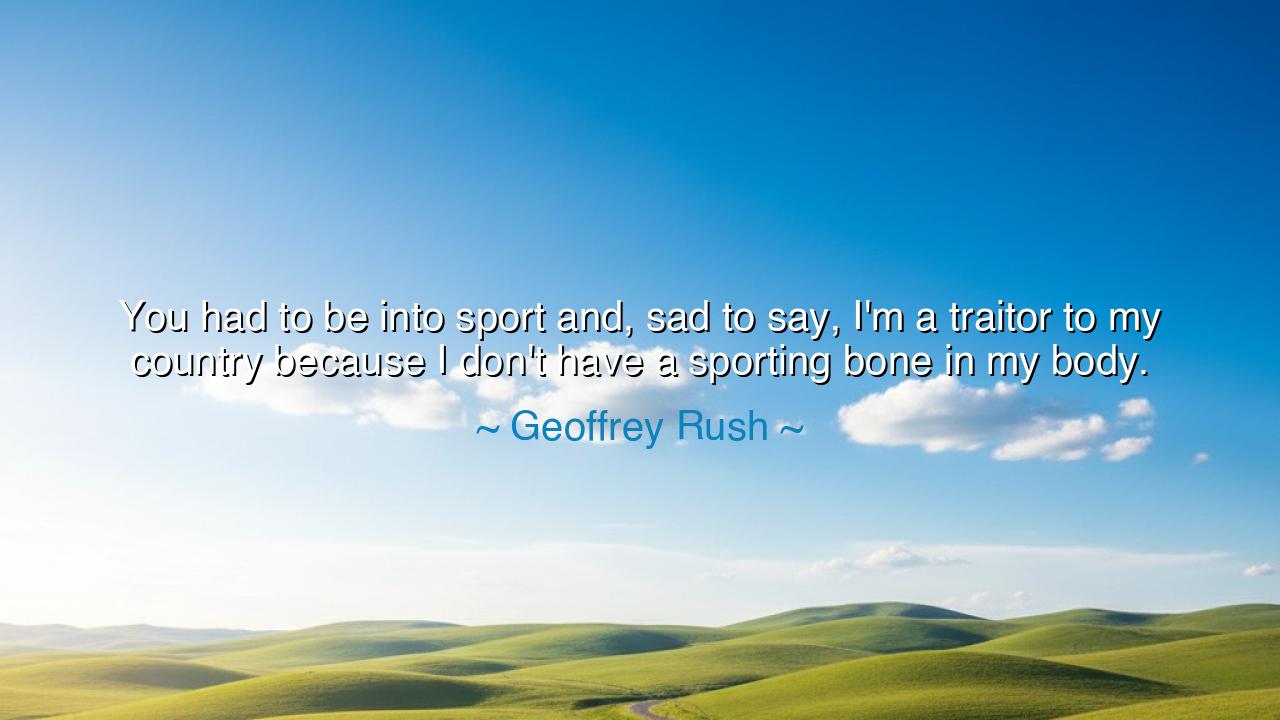
You had to be into sport and, sad to say, I'm a traitor to my
You had to be into sport and, sad to say, I'm a traitor to my country because I don't have a sporting bone in my body.






Hear the words of Geoffrey Rush, spoken with humor yet shadowed by truth: “You had to be into sport and, sad to say, I'm a traitor to my country because I don't have a sporting bone in my body.” In this playful confession lies more than a jest—it is the cry of one who feels himself outside the rhythm of his culture, a man whose talents do not align with the common expectation. It is a reminder that society often crowns certain virtues above others, yet true greatness may lie in the very things it overlooks.
For in Rush’s homeland, sport is not merely recreation, but a sacred bond. In nations where stadiums are temples and athletes are heroes, to be indifferent to the game is to risk being called an outsider. Rush’s words, then, reveal the pressure of cultural identity: that to be accepted, one must embrace what the multitude embraces. To step away, even by nature and not by choice, feels like betrayal. Thus he names himself, in jest but also with sting, a traitor—not to the soil of his birth, but to its customs and loves.
Yet here lies the deeper meaning: that a man’s worth is not defined by whether he carries the flag of the majority, but by whether he discovers and honors his own gifts. Geoffrey Rush did not stride upon the field, but upon the stage; his victories were not scored in goals or runs, but in performances that moved the soul. The world may clamor for sporting bones, but art, intellect, and imagination are no less vital. His so-called betrayal is, in truth, his offering—a different path of greatness, carved against the grain of expectation.
History offers us many examples of those who defied the customs of their people. Socrates, in a city of warriors and politicians, chose instead the life of the questioning philosopher, and though condemned for it, became immortal in wisdom. Leonardo da Vinci, in a world that prized conquest, turned his eyes not to the battlefield but to the canvas and the sketchbook, and in so doing, conquered eternity itself. Each was called strange, unfit, even traitorous to the norms of their time, yet each gave the world treasures that outlasted the triumphs of athletes and kings.
Thus, the quote teaches that one must embrace difference with courage. It is not shameful to lack the gifts that others prize, so long as one nurtures the gifts one truly possesses. The sadness Rush names is not in lacking sport, but in the human tendency to measure worth by conformity. True nobility is to honor what you are, even when the crowd demands something else. To betray expectation is sometimes to be faithful to destiny.
The lesson, then, is clear: do not despise yourself for not fitting the mold of your society. If the world values strength, yet you carry sensitivity, cherish it. If the crowd honors speed, yet you bring wisdom, hold it high. Each man and woman is given a different gift, and the greatness of humanity lies not in sameness but in the harmony of differences. The stage needs actors, the fields need athletes, the halls need thinkers, the world needs all.
Practical is this counsel: look within and ask not, “What does my culture demand of me?” but, “What has been planted within me to give?” If your passion is not sport but art, music, teaching, invention, or compassion, then pursue it boldly. And when the multitude mocks or misunderstands, remember Rush’s jest, and know that so-called betrayal may be the highest form of fidelity—to yourself and to the truth.
So let this saying stand not as self-reproach but as a beacon: to lack a sporting bone is no betrayal, so long as the heart beats with purpose. The true traitor is not he who rejects the crowd’s pastime, but he who buries his own calling for fear of disapproval. Live your gift, whatever it may be, and the world, though slow to see, will one day call it greatness.






AAdministratorAdministrator
Welcome, honored guests. Please leave a comment, we will respond soon